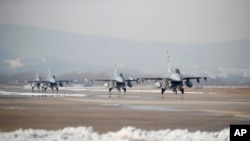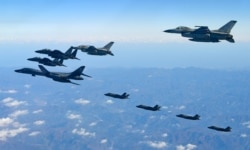The U.S. intends to hold aerial exercises with South Korea as planned, despite North Korea's accusation that the joint drills are "confrontational."
"We don't scale [back] or conduct our exercises based on North Korea's anger," said Pentagon Spokesman Lt. Col. Dave Eastburn in an email message to VOA's Korean Service.
He was responding to a statement carried by North Korea's official Korean Central News Agency on Wednesday, slamming the U.S. for preparing to hold joint aerial drills with South Korea next month.
Kwon Jong Gun, a roving ambassador for North Korea's Foreign Ministry, said the U.S. plans to hold the joint drills "amounts to a declaration of confrontation" with North Korea.
Since U.S. President Donald Trump met North Korean leader Kim Jong Un at their historic Singapore summit in June 2018 the U.S. has either suspended or scaled down the joint military exercises it holds with South Korea in order to enhance the atmosphere for denuclearization talks to continue.
The aerial drills, dubbed Vigilant Ace, have been held each December since 2015. In 2017, the Vigilant Ace exercises involved hundreds of aircrafts and fighter jets. The allies canceled the drills in 2018.
South Korea's Yonhap News Agency reported Thursday that this year's air drills will be scaled down compared to the previous exercises, quoting an anonymous source.
At a press briefing Thursday at the Pentagon, Rear Admiral William Byrne, vice director of the Joint Staff, said the drills will be cut back this year.
"I am not going to talk specific force numbers, specific airplane numbers," said Byrne. "But it's a reduced scope from the former Vigilant Ace exercises." He added that the scaled-back drills meet "all the requirements of the ROK air force and U.S. air force to ensure readiness," referring to South Korea by its official English name, the Republic of Korea.
Eastburn said this year's air exercises will be called "the Combined Flying Training Event."
In his Wednesday statement, Kwon described the joint drills as a "provocative and dangerous act," adding that the U.S. in its "reckless military frenzy" is "throwing a wet blanket over the spark of the DPRK-U.S. dialogue on the verge of extinction." The DPRK is the acronym for North Korea's official name in English, the Democratic People's Republic of Korea.
Kwon was a member of a North Korean delegation that held working-level talks with the U.S. in Stockholm in October.
The Stockholm talks broke down quickly when North Korea walked away from the negotiating table without reaching any compromise with the U.S. on how to sync the steps and scale of denuclearization and sanctions relief, sending the talks back to the state of impasse.
Washington and Pyongyang were unable to narrow their differences in part because Trump rejected Kim's offer of partial denuclearization for sanctions relief. Instead, Trump asked for full denuclearization at the failed Hanoi Summit held in February.
In his email message to VOA, Eastburn said, "Our exercises ensure readiness and enhance interoperability between the U.S. and South Korea while allowing the diplomats the space they need to have open conversations with North Korea."
While demanding the U.S. change its denuclearization stance by the end of the year, North Korea launched what it called a "super-large" multiple rocket launcher system, making it its 12th test this year since May.
Signaling more provocations, Kwon said, "Our patience is nearing the limitations and we will never remain an onlooker to the reckless military moves of the U.S."
When the U.S. and South Korea began their annual summer joint military exercises in August, North Korea launched two missiles, warning the allies to halt the drills.
The August drills were called "command-post training" in place of regular Ulchi Freedom Guardian and involved computer-simulated trainings unaccompanied by regularly held field combat exercises. The allies' annual spring exercises, called Foal Eagle and Key Resolve, were cancelled this year. The Key Resolve exercises were replaced by the scaled-down Dong Maeng drills in March.
The U.S. and South Korea have been conducting annual military exercises since 1955, months after the end of the Korean War, in order to maintain their combat abilities to defend against North Korea. There are about 28,500 American troops currently stationed in South Korea.
Christy Lee contributed to this report from VOA's Korean Service.
















